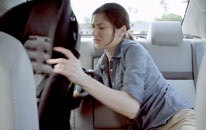5 Strategies to Conquer Your Kid’s Doctor Phobia

by Peg Rosen
Parents aren’t always naturals at soothing their children’s fear of doctors or dentists. But there are things they can do to make the visits less upsetting, says Meghan D. Kelly, M.S.Ed., C.C.L.S., director of the Phoebe H. Stein Child Life Program at The Children’s Hospital at Montefiore Medical Center in New York City. Besides staying calm, keep this advice in mind:
Doctor Phobia Strategy No. 5: Be up front. “Believe it or not, I’ve seen some kids coming in for surgery whose parents told them they were going to Toys”R”Us,” says Kelly. Not helpful. If you’re going for a routine checkup, explain to your kids that in order for them to have strong bodies and healthy teeth, their doctor needs to check if everything is working well. Describe what the doctor might do: look in his ears, listen to his chest, etc.
Doctor Phobia Strategy No. 4: Don’t make promises you can’t keep. Promising “no shots” is a bad way to get kids through the door — unless you’re 100 percent sure there won’t be any. An artful omission is OK, though. “You can say, ‘I’m not sure what’s going to happen today, but I trust the doctor to decide what you need,’” says Kelly.
Doctor Phobia Strategy No. 3: Acknowledge the fear. Denying that something might hurt or telling your crying child to “be a big girl” will only make her feel ashamed and more anxious, says Kelly. Instead, validate what she’s feeling and offer coping strategies, such as “If you want, I can count to three. When I’m done, it will be over.”
Doctor Phobia Strategy No. 2: Use comfort strategies. Giving kids choices makes them feel a bit more in control, which ultimately eases anxiety. Let them decide where they’d like to sit during the exam — on the table or on a chair. Use the art of distraction. Chat about a favorite show or read a picture book you’ve brought along.
Doctor Phobia Strategy No. 1: Use low-key language. If a shot is unavoidable, stay away from words like “sting” or “burn.” Instead, Kelly suggests saying, “You’re going to feel the doctor pressing on your arm. It might feel warm, and then it will be finished.”
If your pediatrician seems insensitive to your child’s fears, set up a time to address your concerns. If she still doesn’t get it, it may be time to move on.
Photo: @iStockphoto.com/mediaphotos
has contributed to numerous magazines and websites, including Healthy Kids, MORE, Redbook, SELF, Real Simple, Parents, Family Circle, American Baby, ParentCenter.com and WebMD.com. She blogs at Relish-This.Blogspot.com.
More on More on health and hygiene for kids from our sponsor from our sponsor




